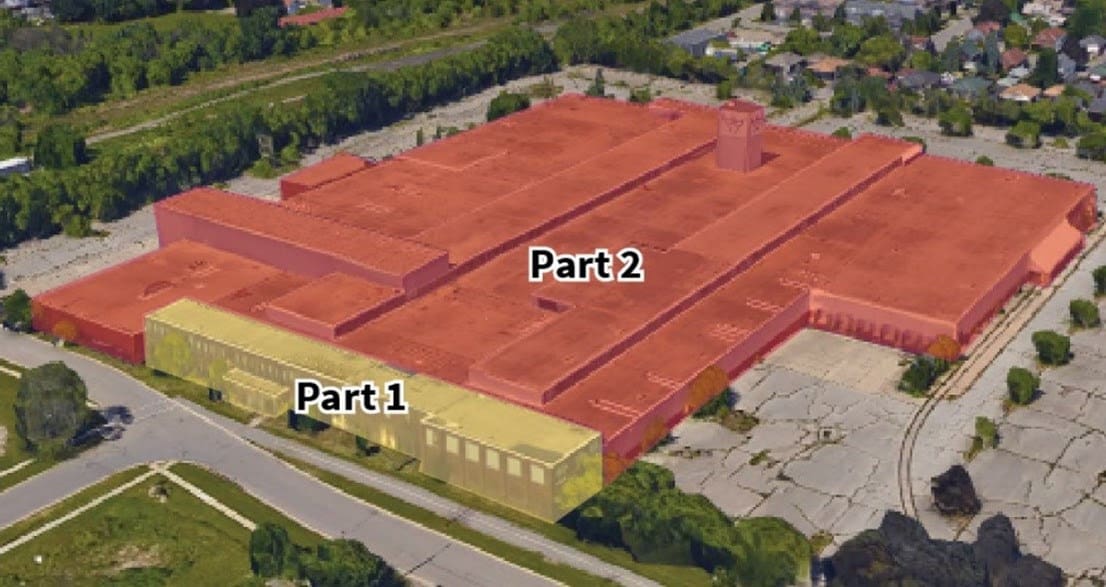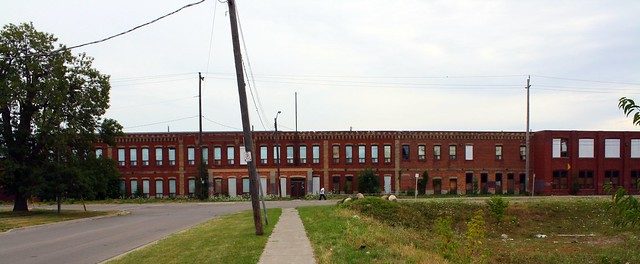Front Street facade of future home of new Oshawa GO Station to be preserved; rest to be demolished
Published August 29, 2023 at 4:39 pm

The redbrick façade from an 1897 re-build of the Ontario Malleable Iron Co. factory facing Front Street in Oshawa will be preserved when Metrolinx gets to work building a new GO Station on the site.
The rest of the massive structure, which was home to a Knob Hill Farms location – Ontario’s largest grocery store when it opened in 1983 – will be demolished to make way for the new station, which has been on the wish list for the forlorn and forgotten part of the city since former Toronto Maple Leafs owner Steve Stavros abruptly closed the food terminal in 2000.
Metrolinx opened the Pre-Qualification Procurement Tender this week for the 226,000 sq. ft property and agreed to preserve the Front Street side, home to an iron foundry from 1872 to 1977, with part of the structure still well preserved.
The Knob Hill addition will be torn down. During the grocery terminal’s heyday the site was home to a mammoth grocery store, a pharmacy, bakery, dentist’s office, video rental store, wine store and a card shop, with rail spurs running right to the building.
Metrolinx, who acquired the property as the future site of the new station – one of three new GO Stations as the transit agency takes the GO Train all the way to Bowmanville – said in a statement they “recognized the cultural value” of the building to the community.
Metrolinx recently completed a Strategic Conservation Plan for the property to identify potential impacts of the property’s heritage attributes along with a follow-up Heritage Impact Assessment which outlines mitigation measures and a “comprehensive process” for the stabilization and protection of the heritage attributes.

The Front Street (west) side of what will be the future Central Oshawa GO Station
The Front Street side of the structure already has a historical designation and a portion of the building will be “retained, stabilized, and protected” for possible future adaptive re-use.
The rest of the structure was determined to have “no heritage value” after years of neglect and decay and has required on-site security for many years to reduce the risk of break-ins, fires, and vandalism. The removal of the non-heritage components, Metrolinx believes, “will mitigate these potential safety risks while also enabling the delivery of the proposed Ritson Road GO Station.”
Metrolinx has been working with Oshawa’s Heritage Committee on the tender to ensure it is awarded to a “qualified vendor” with experience in large-scale demolition and especially heritage restoration.
The Ontario Malleable Iron Co. played an important part in Oshawa’s industrial and labour history. It was the site of one of the country’s first strikes in 1900 and when the original plant was destroyed by fire in 1894 the New York Times called the company one of the most “important” industries in Canada.
A second strike in 1940 lasted 23 days and ended with workers receiving a 7.5 per cent increase in wages, a five-day, 45 hour work week and time-and-a-half for overtime.
There were additional strikes in 1945 and 1966 and employees were locked out of the plant in 1976 over a pay dispute. Those workers never returned to their jobs as the plant was closed by owners ITT Grinnell 14 months later in the spring of 1977.

Photo Glenn Hendry





